Reflective Essay on Emotional Intelligence
VerifiedAdded on 2023/01/16
|7
|2457
|80
AI Summary
This reflective essay discusses a time when the author showed poor emotional intelligence and evaluates their reactions. It also reflects on their current emotional intelligence, strengths, weaknesses, and areas for improvement.
Contribute Materials
Your contribution can guide someone’s learning journey. Share your
documents today.
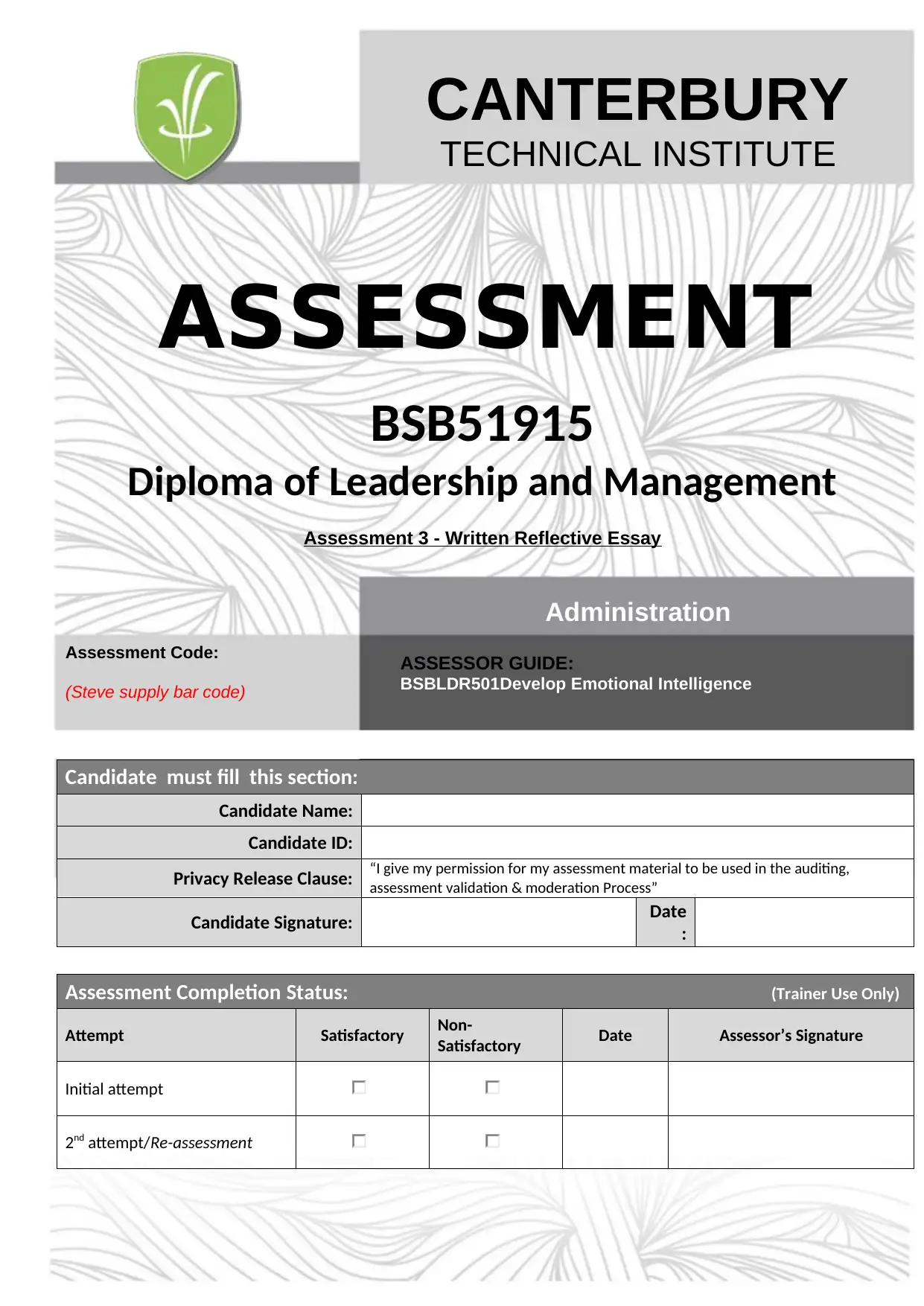
Candidate must fill this section:
Candidate Name:
Candidate ID:
Privacy Release Clause: “I give my permission for my assessment material to be used in the auditing,
assessment validation & moderation Process”
Candidate Signature: Date
:
Assessment Completion Status: (Trainer Use Only)
Attempt Satisfactory Non-
Satisfactory Date Assessor’s Signature
Initial attempt
2nd attempt/Re-assessment
CANTERBURY
TECHNICAL INSTITUTE
ASSESSOR GUIDE:
BSBLDR501Develop Emotional Intelligence
Administration
ASSESSMENT
BSB51915
Diploma of Leadership and Management
Assessment 3 - Written Reflective Essay
Assessment Code:
(Steve supply bar code)
Candidate Name:
Candidate ID:
Privacy Release Clause: “I give my permission for my assessment material to be used in the auditing,
assessment validation & moderation Process”
Candidate Signature: Date
:
Assessment Completion Status: (Trainer Use Only)
Attempt Satisfactory Non-
Satisfactory Date Assessor’s Signature
Initial attempt
2nd attempt/Re-assessment
CANTERBURY
TECHNICAL INSTITUTE
ASSESSOR GUIDE:
BSBLDR501Develop Emotional Intelligence
Administration
ASSESSMENT
BSB51915
Diploma of Leadership and Management
Assessment 3 - Written Reflective Essay
Assessment Code:
(Steve supply bar code)
Secure Best Marks with AI Grader
Need help grading? Try our AI Grader for instant feedback on your assignments.
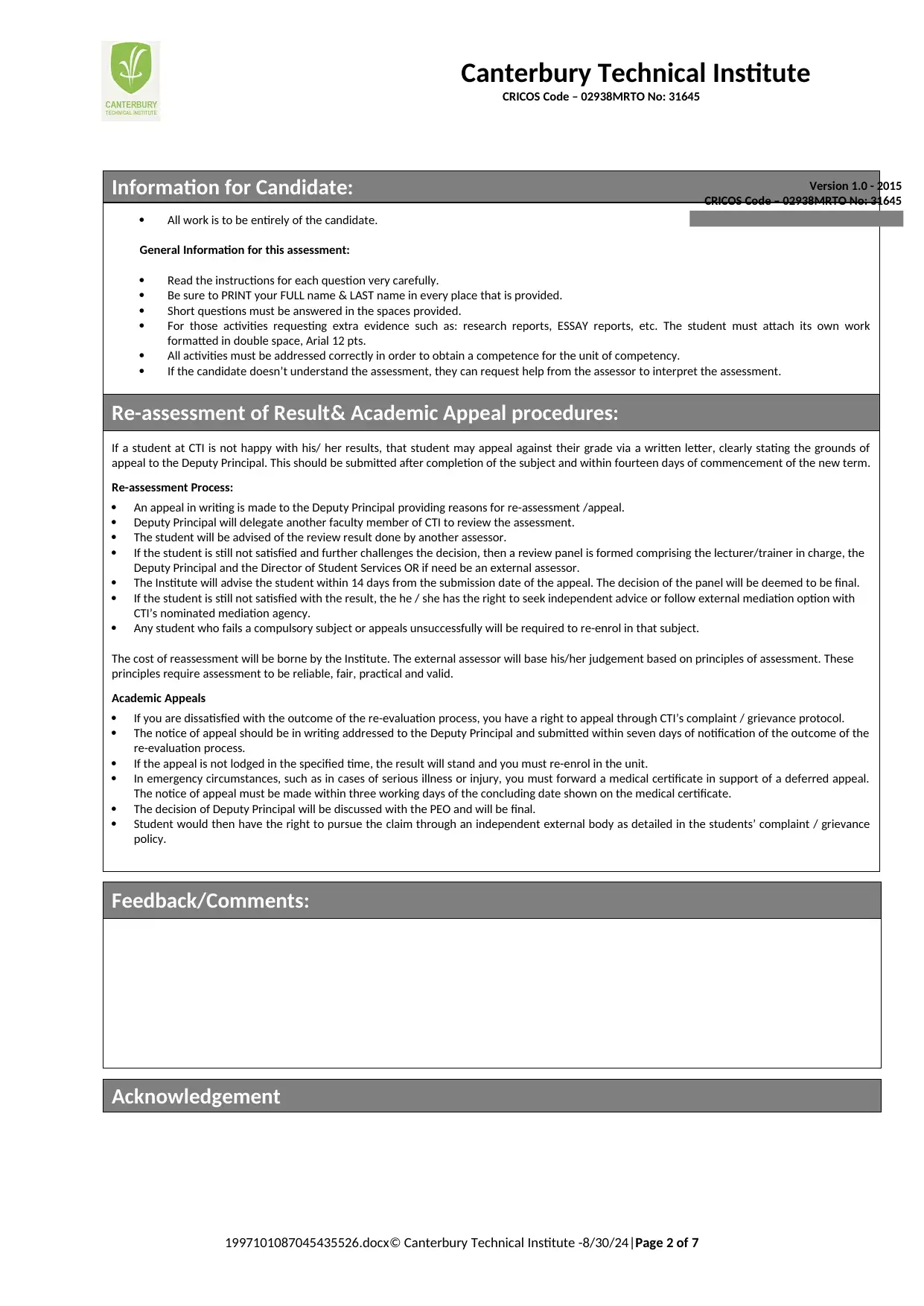
Canterbury Technical Institute
CRICOS Code – 02938MRTO No: 31645
Information for Candidate:
All work is to be entirely of the candidate.
General Information for this assessment:
Read the instructions for each question very carefully.
Be sure to PRINT your FULL name & LAST name in every place that is provided.
Short questions must be answered in the spaces provided.
For those activities requesting extra evidence such as: research reports, ESSAY reports, etc. The student must attach its own work
formatted in double space, Arial 12 pts.
All activities must be addressed correctly in order to obtain a competence for the unit of competency.
If the candidate doesn’t understand the assessment, they can request help from the assessor to interpret the assessment.
Re-assessment of Result& Academic Appeal procedures:
If a student at CTI is not happy with his/ her results, that student may appeal against their grade via a written letter, clearly stating the grounds of
appeal to the Deputy Principal. This should be submitted after completion of the subject and within fourteen days of commencement of the new term.
Re-assessment Process:
An appeal in writing is made to the Deputy Principal providing reasons for re-assessment /appeal.
Deputy Principal will delegate another faculty member of CTI to review the assessment.
The student will be advised of the review result done by another assessor.
If the student is still not satisfied and further challenges the decision, then a review panel is formed comprising the lecturer/trainer in charge, the
Deputy Principal and the Director of Student Services OR if need be an external assessor.
The Institute will advise the student within 14 days from the submission date of the appeal. The decision of the panel will be deemed to be final.
If the student is still not satisfied with the result, the he / she has the right to seek independent advice or follow external mediation option with
CTI’s nominated mediation agency.
Any student who fails a compulsory subject or appeals unsuccessfully will be required to re-enrol in that subject.
The cost of reassessment will be borne by the Institute. The external assessor will base his/her judgement based on principles of assessment. These
principles require assessment to be reliable, fair, practical and valid.
Academic Appeals
If you are dissatisfied with the outcome of the re-evaluation process, you have a right to appeal through CTI’s complaint / grievance protocol.
The notice of appeal should be in writing addressed to the Deputy Principal and submitted within seven days of notification of the outcome of the
re-evaluation process.
If the appeal is not lodged in the specified time, the result will stand and you must re-enrol in the unit.
In emergency circumstances, such as in cases of serious illness or injury, you must forward a medical certificate in support of a deferred appeal.
The notice of appeal must be made within three working days of the concluding date shown on the medical certificate.
The decision of Deputy Principal will be discussed with the PEO and will be final.
Student would then have the right to pursue the claim through an independent external body as detailed in the students’ complaint / grievance
policy.
Feedback/Comments:
Acknowledgement
1997101087045435526.docx© Canterbury Technical Institute -8/30/24|Page 2 of 7
Version 1.0 - 2015
CRICOS Code – 02938MRTO No: 31645
CRICOS Code – 02938MRTO No: 31645
Information for Candidate:
All work is to be entirely of the candidate.
General Information for this assessment:
Read the instructions for each question very carefully.
Be sure to PRINT your FULL name & LAST name in every place that is provided.
Short questions must be answered in the spaces provided.
For those activities requesting extra evidence such as: research reports, ESSAY reports, etc. The student must attach its own work
formatted in double space, Arial 12 pts.
All activities must be addressed correctly in order to obtain a competence for the unit of competency.
If the candidate doesn’t understand the assessment, they can request help from the assessor to interpret the assessment.
Re-assessment of Result& Academic Appeal procedures:
If a student at CTI is not happy with his/ her results, that student may appeal against their grade via a written letter, clearly stating the grounds of
appeal to the Deputy Principal. This should be submitted after completion of the subject and within fourteen days of commencement of the new term.
Re-assessment Process:
An appeal in writing is made to the Deputy Principal providing reasons for re-assessment /appeal.
Deputy Principal will delegate another faculty member of CTI to review the assessment.
The student will be advised of the review result done by another assessor.
If the student is still not satisfied and further challenges the decision, then a review panel is formed comprising the lecturer/trainer in charge, the
Deputy Principal and the Director of Student Services OR if need be an external assessor.
The Institute will advise the student within 14 days from the submission date of the appeal. The decision of the panel will be deemed to be final.
If the student is still not satisfied with the result, the he / she has the right to seek independent advice or follow external mediation option with
CTI’s nominated mediation agency.
Any student who fails a compulsory subject or appeals unsuccessfully will be required to re-enrol in that subject.
The cost of reassessment will be borne by the Institute. The external assessor will base his/her judgement based on principles of assessment. These
principles require assessment to be reliable, fair, practical and valid.
Academic Appeals
If you are dissatisfied with the outcome of the re-evaluation process, you have a right to appeal through CTI’s complaint / grievance protocol.
The notice of appeal should be in writing addressed to the Deputy Principal and submitted within seven days of notification of the outcome of the
re-evaluation process.
If the appeal is not lodged in the specified time, the result will stand and you must re-enrol in the unit.
In emergency circumstances, such as in cases of serious illness or injury, you must forward a medical certificate in support of a deferred appeal.
The notice of appeal must be made within three working days of the concluding date shown on the medical certificate.
The decision of Deputy Principal will be discussed with the PEO and will be final.
Student would then have the right to pursue the claim through an independent external body as detailed in the students’ complaint / grievance
policy.
Feedback/Comments:
Acknowledgement
1997101087045435526.docx© Canterbury Technical Institute -8/30/24|Page 2 of 7
Version 1.0 - 2015
CRICOS Code – 02938MRTO No: 31645
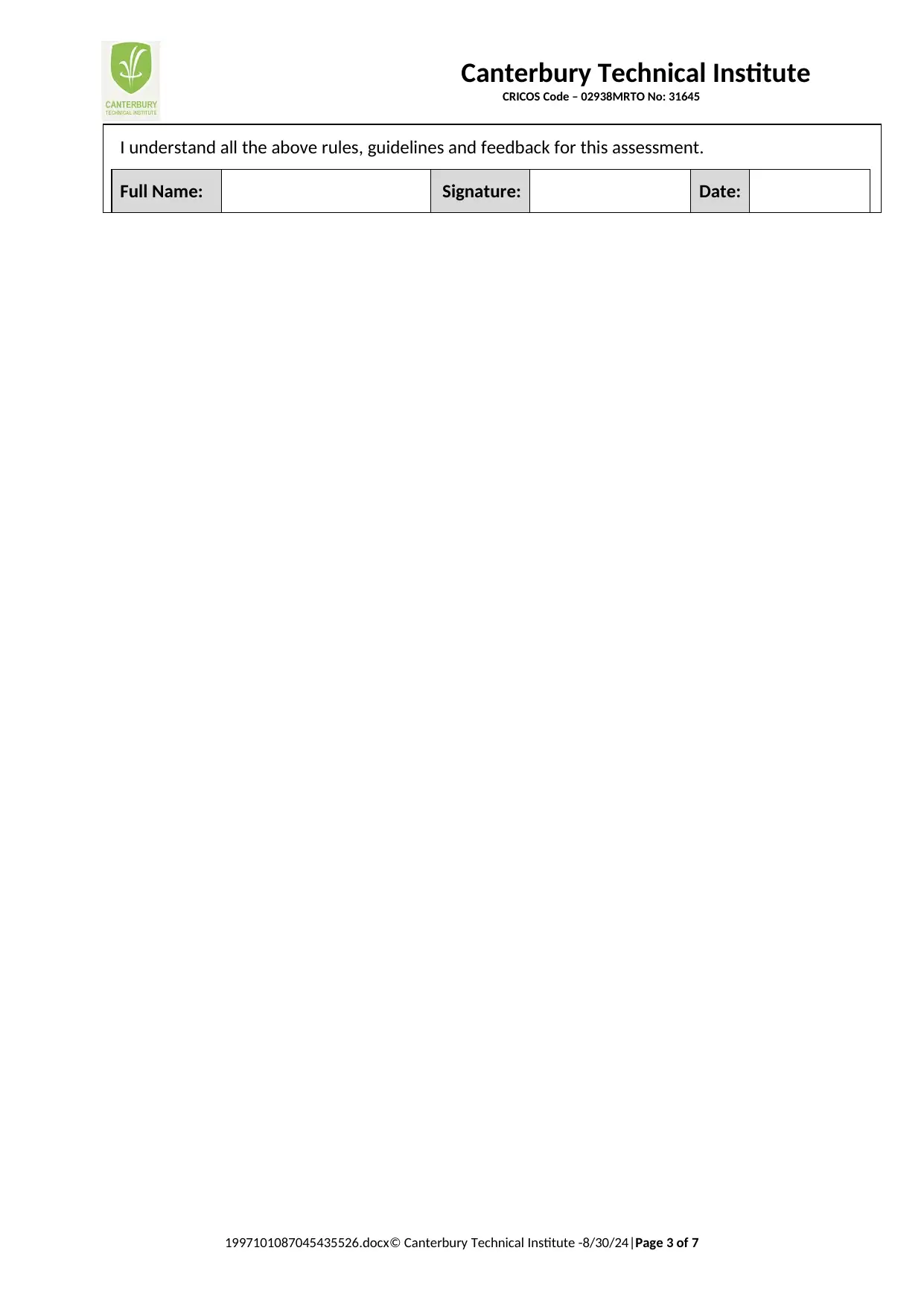
Canterbury Technical Institute
CRICOS Code – 02938MRTO No: 31645
I understand all the above rules, guidelines and feedback for this assessment.
Full Name: Signature: Date:
1997101087045435526.docx© Canterbury Technical Institute -8/30/24|Page 3 of 7
CRICOS Code – 02938MRTO No: 31645
I understand all the above rules, guidelines and feedback for this assessment.
Full Name: Signature: Date:
1997101087045435526.docx© Canterbury Technical Institute -8/30/24|Page 3 of 7
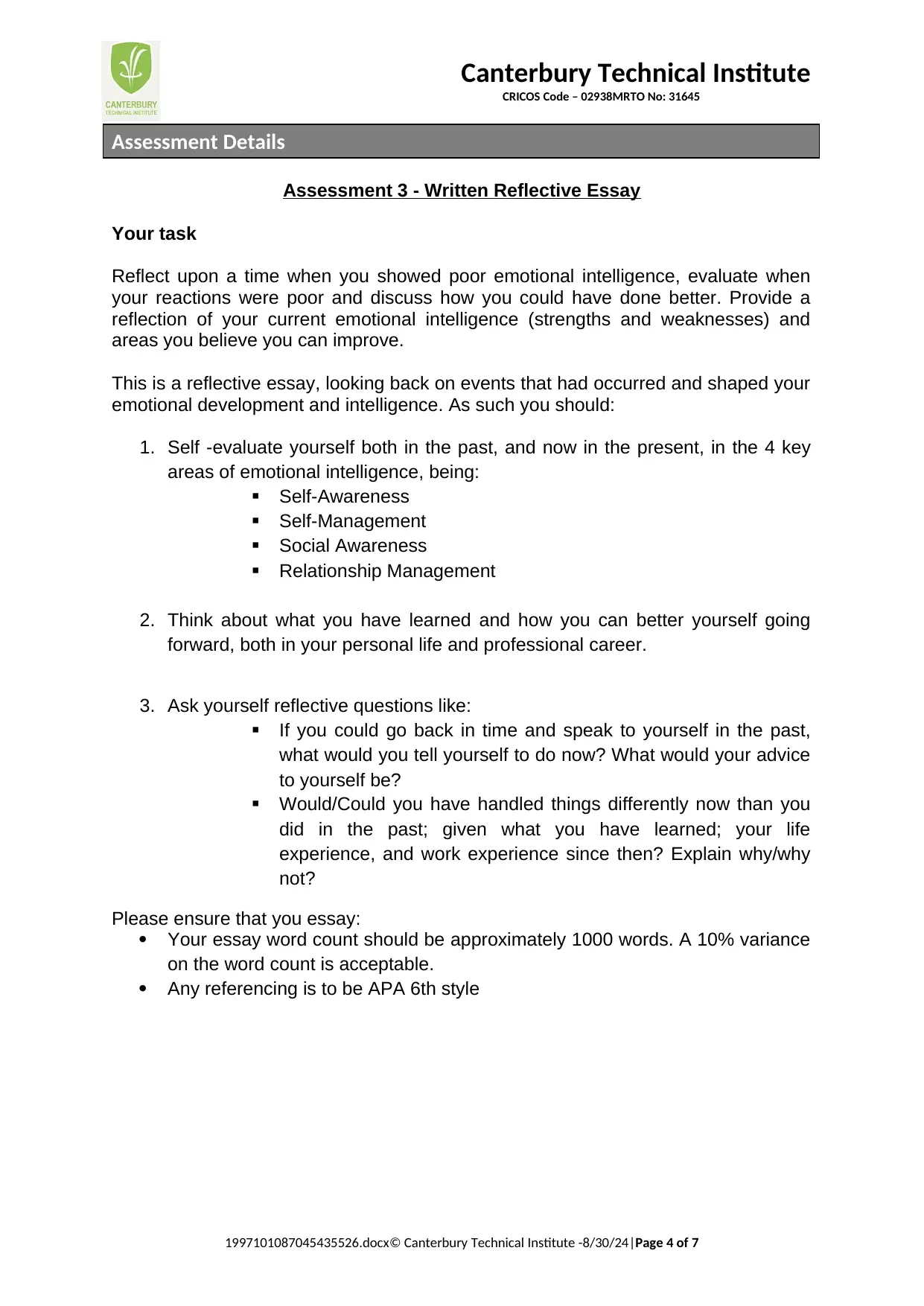
Canterbury Technical Institute
CRICOS Code – 02938MRTO No: 31645
Assessment Details
Assessment 3 - Written Reflective Essay
Your task
Reflect upon a time when you showed poor emotional intelligence, evaluate when
your reactions were poor and discuss how you could have done better. Provide a
reflection of your current emotional intelligence (strengths and weaknesses) and
areas you believe you can improve.
This is a reflective essay, looking back on events that had occurred and shaped your
emotional development and intelligence. As such you should:
1. Self -evaluate yourself both in the past, and now in the present, in the 4 key
areas of emotional intelligence, being:
Self-Awareness
Self-Management
Social Awareness
Relationship Management
2. Think about what you have learned and how you can better yourself going
forward, both in your personal life and professional career.
3. Ask yourself reflective questions like:
If you could go back in time and speak to yourself in the past,
what would you tell yourself to do now? What would your advice
to yourself be?
Would/Could you have handled things differently now than you
did in the past; given what you have learned; your life
experience, and work experience since then? Explain why/why
not?
Please ensure that you essay:
Your essay word count should be approximately 1000 words. A 10% variance
on the word count is acceptable.
Any referencing is to be APA 6th style
1997101087045435526.docx© Canterbury Technical Institute -8/30/24|Page 4 of 7
CRICOS Code – 02938MRTO No: 31645
Assessment Details
Assessment 3 - Written Reflective Essay
Your task
Reflect upon a time when you showed poor emotional intelligence, evaluate when
your reactions were poor and discuss how you could have done better. Provide a
reflection of your current emotional intelligence (strengths and weaknesses) and
areas you believe you can improve.
This is a reflective essay, looking back on events that had occurred and shaped your
emotional development and intelligence. As such you should:
1. Self -evaluate yourself both in the past, and now in the present, in the 4 key
areas of emotional intelligence, being:
Self-Awareness
Self-Management
Social Awareness
Relationship Management
2. Think about what you have learned and how you can better yourself going
forward, both in your personal life and professional career.
3. Ask yourself reflective questions like:
If you could go back in time and speak to yourself in the past,
what would you tell yourself to do now? What would your advice
to yourself be?
Would/Could you have handled things differently now than you
did in the past; given what you have learned; your life
experience, and work experience since then? Explain why/why
not?
Please ensure that you essay:
Your essay word count should be approximately 1000 words. A 10% variance
on the word count is acceptable.
Any referencing is to be APA 6th style
1997101087045435526.docx© Canterbury Technical Institute -8/30/24|Page 4 of 7
Secure Best Marks with AI Grader
Need help grading? Try our AI Grader for instant feedback on your assignments.
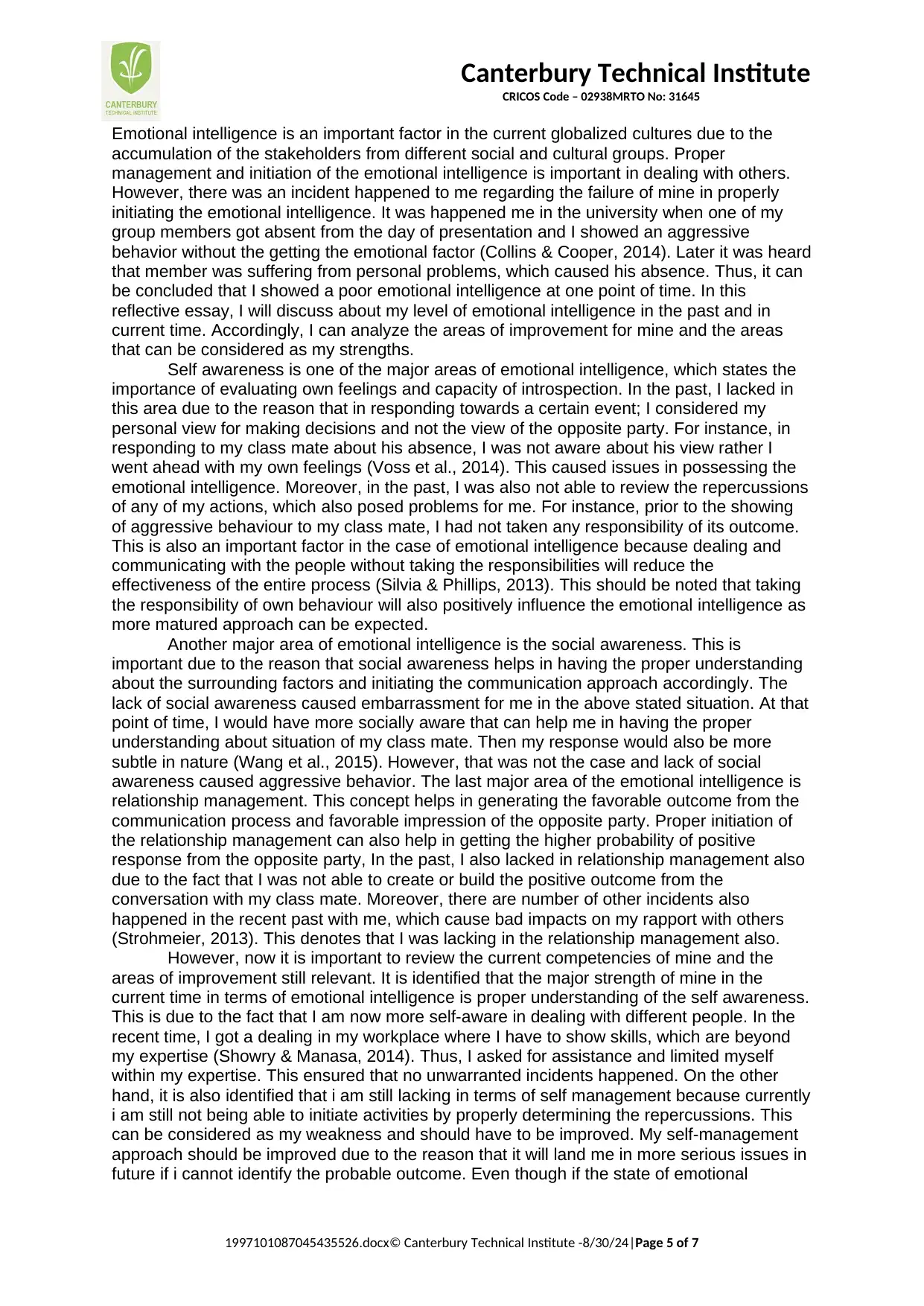
Canterbury Technical Institute
CRICOS Code – 02938MRTO No: 31645
Emotional intelligence is an important factor in the current globalized cultures due to the
accumulation of the stakeholders from different social and cultural groups. Proper
management and initiation of the emotional intelligence is important in dealing with others.
However, there was an incident happened to me regarding the failure of mine in properly
initiating the emotional intelligence. It was happened me in the university when one of my
group members got absent from the day of presentation and I showed an aggressive
behavior without the getting the emotional factor (Collins & Cooper, 2014). Later it was heard
that member was suffering from personal problems, which caused his absence. Thus, it can
be concluded that I showed a poor emotional intelligence at one point of time. In this
reflective essay, I will discuss about my level of emotional intelligence in the past and in
current time. Accordingly, I can analyze the areas of improvement for mine and the areas
that can be considered as my strengths.
Self awareness is one of the major areas of emotional intelligence, which states the
importance of evaluating own feelings and capacity of introspection. In the past, I lacked in
this area due to the reason that in responding towards a certain event; I considered my
personal view for making decisions and not the view of the opposite party. For instance, in
responding to my class mate about his absence, I was not aware about his view rather I
went ahead with my own feelings (Voss et al., 2014). This caused issues in possessing the
emotional intelligence. Moreover, in the past, I was also not able to review the repercussions
of any of my actions, which also posed problems for me. For instance, prior to the showing
of aggressive behaviour to my class mate, I had not taken any responsibility of its outcome.
This is also an important factor in the case of emotional intelligence because dealing and
communicating with the people without taking the responsibilities will reduce the
effectiveness of the entire process (Silvia & Phillips, 2013). This should be noted that taking
the responsibility of own behaviour will also positively influence the emotional intelligence as
more matured approach can be expected.
Another major area of emotional intelligence is the social awareness. This is
important due to the reason that social awareness helps in having the proper understanding
about the surrounding factors and initiating the communication approach accordingly. The
lack of social awareness caused embarrassment for me in the above stated situation. At that
point of time, I would have more socially aware that can help me in having the proper
understanding about situation of my class mate. Then my response would also be more
subtle in nature (Wang et al., 2015). However, that was not the case and lack of social
awareness caused aggressive behavior. The last major area of the emotional intelligence is
relationship management. This concept helps in generating the favorable outcome from the
communication process and favorable impression of the opposite party. Proper initiation of
the relationship management can also help in getting the higher probability of positive
response from the opposite party, In the past, I also lacked in relationship management also
due to the fact that I was not able to create or build the positive outcome from the
conversation with my class mate. Moreover, there are number of other incidents also
happened in the recent past with me, which cause bad impacts on my rapport with others
(Strohmeier, 2013). This denotes that I was lacking in the relationship management also.
However, now it is important to review the current competencies of mine and the
areas of improvement still relevant. It is identified that the major strength of mine in the
current time in terms of emotional intelligence is proper understanding of the self awareness.
This is due to the fact that I am now more self-aware in dealing with different people. In the
recent time, I got a dealing in my workplace where I have to show skills, which are beyond
my expertise (Showry & Manasa, 2014). Thus, I asked for assistance and limited myself
within my expertise. This ensured that no unwarranted incidents happened. On the other
hand, it is also identified that i am still lacking in terms of self management because currently
i am still not being able to initiate activities by properly determining the repercussions. This
can be considered as my weakness and should have to be improved. My self-management
approach should be improved due to the reason that it will land me in more serious issues in
future if i cannot identify the probable outcome. Even though if the state of emotional
1997101087045435526.docx© Canterbury Technical Institute -8/30/24|Page 5 of 7
CRICOS Code – 02938MRTO No: 31645
Emotional intelligence is an important factor in the current globalized cultures due to the
accumulation of the stakeholders from different social and cultural groups. Proper
management and initiation of the emotional intelligence is important in dealing with others.
However, there was an incident happened to me regarding the failure of mine in properly
initiating the emotional intelligence. It was happened me in the university when one of my
group members got absent from the day of presentation and I showed an aggressive
behavior without the getting the emotional factor (Collins & Cooper, 2014). Later it was heard
that member was suffering from personal problems, which caused his absence. Thus, it can
be concluded that I showed a poor emotional intelligence at one point of time. In this
reflective essay, I will discuss about my level of emotional intelligence in the past and in
current time. Accordingly, I can analyze the areas of improvement for mine and the areas
that can be considered as my strengths.
Self awareness is one of the major areas of emotional intelligence, which states the
importance of evaluating own feelings and capacity of introspection. In the past, I lacked in
this area due to the reason that in responding towards a certain event; I considered my
personal view for making decisions and not the view of the opposite party. For instance, in
responding to my class mate about his absence, I was not aware about his view rather I
went ahead with my own feelings (Voss et al., 2014). This caused issues in possessing the
emotional intelligence. Moreover, in the past, I was also not able to review the repercussions
of any of my actions, which also posed problems for me. For instance, prior to the showing
of aggressive behaviour to my class mate, I had not taken any responsibility of its outcome.
This is also an important factor in the case of emotional intelligence because dealing and
communicating with the people without taking the responsibilities will reduce the
effectiveness of the entire process (Silvia & Phillips, 2013). This should be noted that taking
the responsibility of own behaviour will also positively influence the emotional intelligence as
more matured approach can be expected.
Another major area of emotional intelligence is the social awareness. This is
important due to the reason that social awareness helps in having the proper understanding
about the surrounding factors and initiating the communication approach accordingly. The
lack of social awareness caused embarrassment for me in the above stated situation. At that
point of time, I would have more socially aware that can help me in having the proper
understanding about situation of my class mate. Then my response would also be more
subtle in nature (Wang et al., 2015). However, that was not the case and lack of social
awareness caused aggressive behavior. The last major area of the emotional intelligence is
relationship management. This concept helps in generating the favorable outcome from the
communication process and favorable impression of the opposite party. Proper initiation of
the relationship management can also help in getting the higher probability of positive
response from the opposite party, In the past, I also lacked in relationship management also
due to the fact that I was not able to create or build the positive outcome from the
conversation with my class mate. Moreover, there are number of other incidents also
happened in the recent past with me, which cause bad impacts on my rapport with others
(Strohmeier, 2013). This denotes that I was lacking in the relationship management also.
However, now it is important to review the current competencies of mine and the
areas of improvement still relevant. It is identified that the major strength of mine in the
current time in terms of emotional intelligence is proper understanding of the self awareness.
This is due to the fact that I am now more self-aware in dealing with different people. In the
recent time, I got a dealing in my workplace where I have to show skills, which are beyond
my expertise (Showry & Manasa, 2014). Thus, I asked for assistance and limited myself
within my expertise. This ensured that no unwarranted incidents happened. On the other
hand, it is also identified that i am still lacking in terms of self management because currently
i am still not being able to initiate activities by properly determining the repercussions. This
can be considered as my weakness and should have to be improved. My self-management
approach should be improved due to the reason that it will land me in more serious issues in
future if i cannot identify the probable outcome. Even though if the state of emotional
1997101087045435526.docx© Canterbury Technical Institute -8/30/24|Page 5 of 7
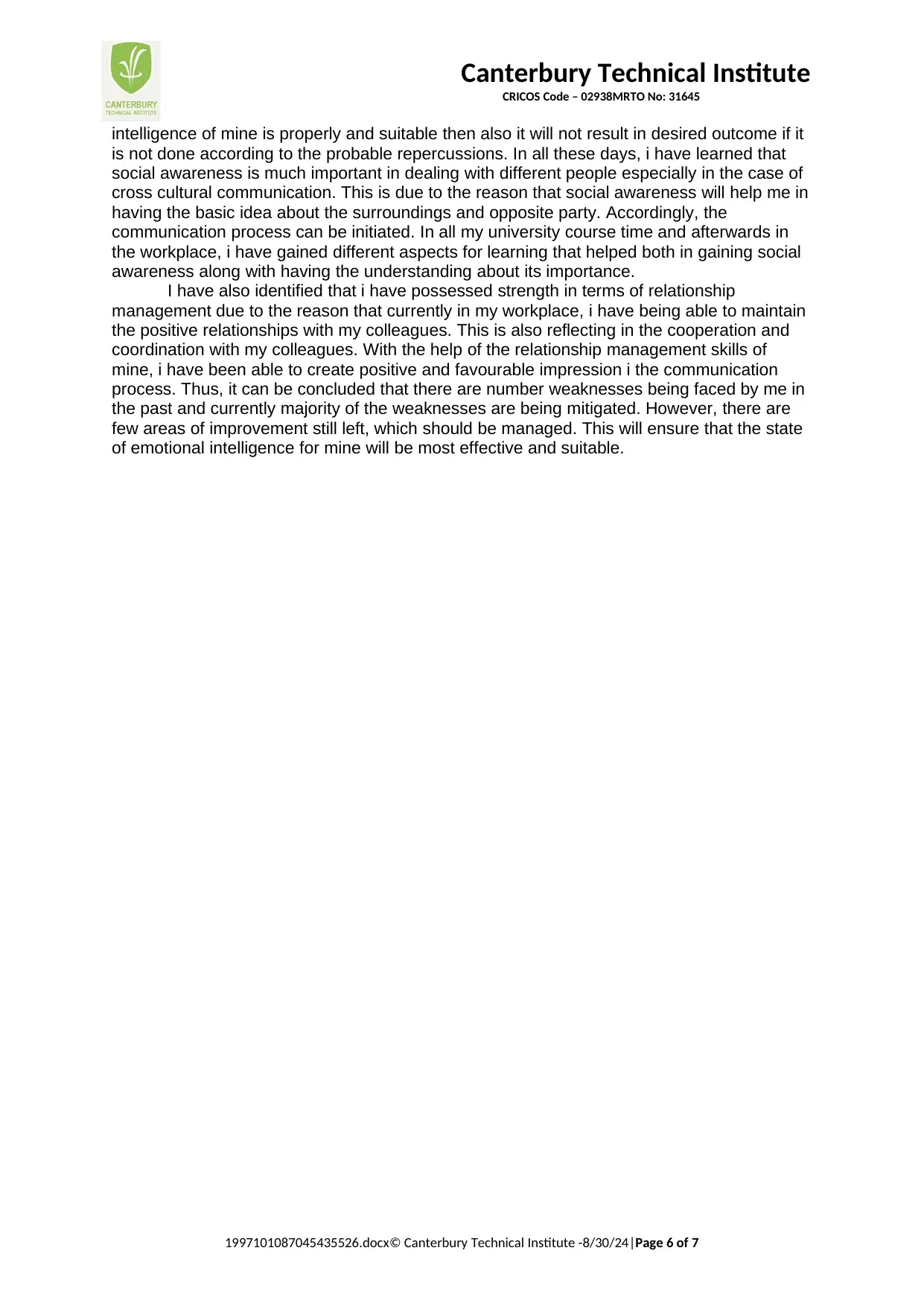
Canterbury Technical Institute
CRICOS Code – 02938MRTO No: 31645
intelligence of mine is properly and suitable then also it will not result in desired outcome if it
is not done according to the probable repercussions. In all these days, i have learned that
social awareness is much important in dealing with different people especially in the case of
cross cultural communication. This is due to the reason that social awareness will help me in
having the basic idea about the surroundings and opposite party. Accordingly, the
communication process can be initiated. In all my university course time and afterwards in
the workplace, i have gained different aspects for learning that helped both in gaining social
awareness along with having the understanding about its importance.
I have also identified that i have possessed strength in terms of relationship
management due to the reason that currently in my workplace, i have being able to maintain
the positive relationships with my colleagues. This is also reflecting in the cooperation and
coordination with my colleagues. With the help of the relationship management skills of
mine, i have been able to create positive and favourable impression i the communication
process. Thus, it can be concluded that there are number weaknesses being faced by me in
the past and currently majority of the weaknesses are being mitigated. However, there are
few areas of improvement still left, which should be managed. This will ensure that the state
of emotional intelligence for mine will be most effective and suitable.
1997101087045435526.docx© Canterbury Technical Institute -8/30/24|Page 6 of 7
CRICOS Code – 02938MRTO No: 31645
intelligence of mine is properly and suitable then also it will not result in desired outcome if it
is not done according to the probable repercussions. In all these days, i have learned that
social awareness is much important in dealing with different people especially in the case of
cross cultural communication. This is due to the reason that social awareness will help me in
having the basic idea about the surroundings and opposite party. Accordingly, the
communication process can be initiated. In all my university course time and afterwards in
the workplace, i have gained different aspects for learning that helped both in gaining social
awareness along with having the understanding about its importance.
I have also identified that i have possessed strength in terms of relationship
management due to the reason that currently in my workplace, i have being able to maintain
the positive relationships with my colleagues. This is also reflecting in the cooperation and
coordination with my colleagues. With the help of the relationship management skills of
mine, i have been able to create positive and favourable impression i the communication
process. Thus, it can be concluded that there are number weaknesses being faced by me in
the past and currently majority of the weaknesses are being mitigated. However, there are
few areas of improvement still left, which should be managed. This will ensure that the state
of emotional intelligence for mine will be most effective and suitable.
1997101087045435526.docx© Canterbury Technical Institute -8/30/24|Page 6 of 7
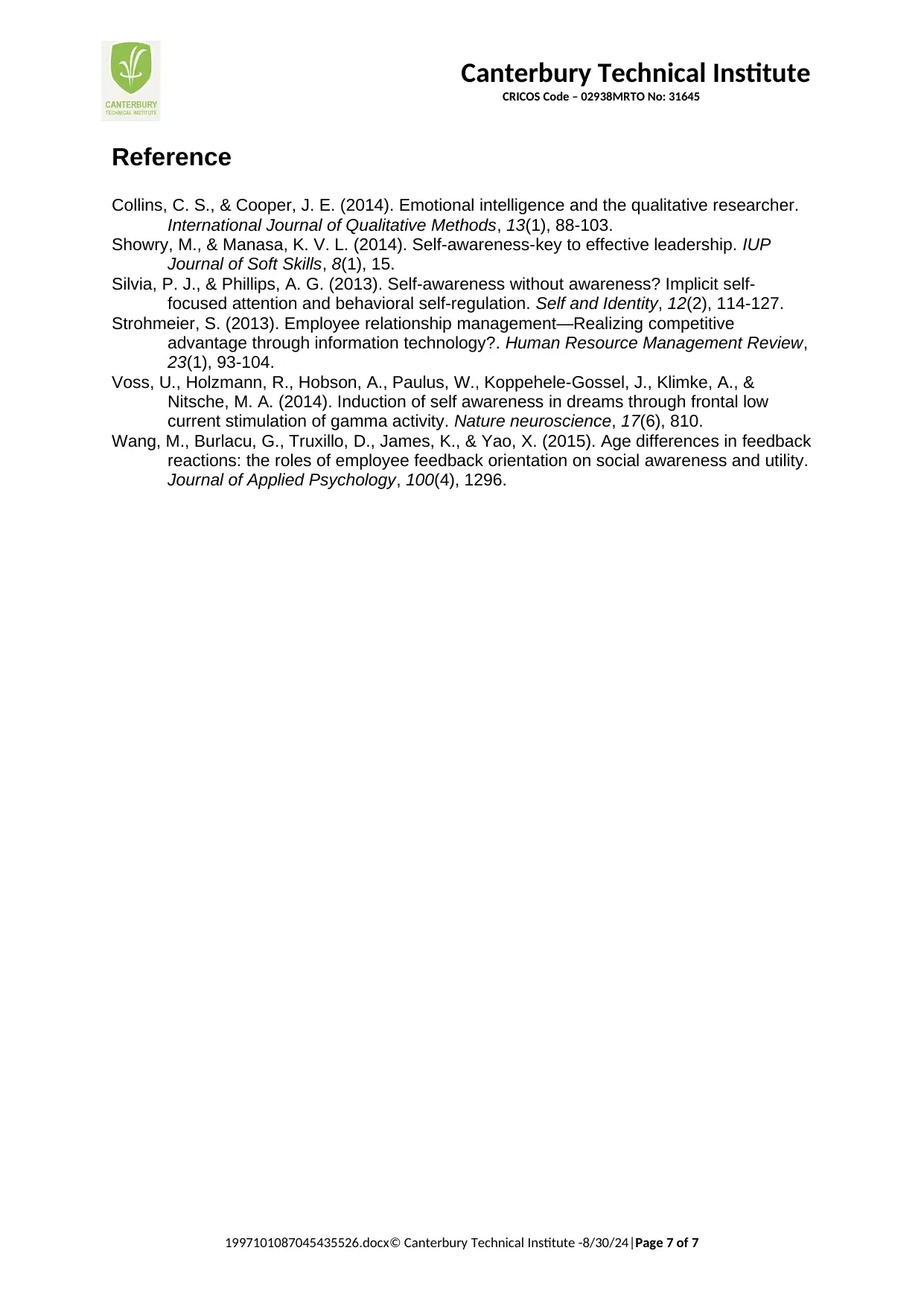
Canterbury Technical Institute
CRICOS Code – 02938MRTO No: 31645
Reference
Collins, C. S., & Cooper, J. E. (2014). Emotional intelligence and the qualitative researcher.
International Journal of Qualitative Methods, 13(1), 88-103.
Showry, M., & Manasa, K. V. L. (2014). Self-awareness-key to effective leadership. IUP
Journal of Soft Skills, 8(1), 15.
Silvia, P. J., & Phillips, A. G. (2013). Self-awareness without awareness? Implicit self-
focused attention and behavioral self-regulation. Self and Identity, 12(2), 114-127.
Strohmeier, S. (2013). Employee relationship management—Realizing competitive
advantage through information technology?. Human Resource Management Review,
23(1), 93-104.
Voss, U., Holzmann, R., Hobson, A., Paulus, W., Koppehele-Gossel, J., Klimke, A., &
Nitsche, M. A. (2014). Induction of self awareness in dreams through frontal low
current stimulation of gamma activity. Nature neuroscience, 17(6), 810.
Wang, M., Burlacu, G., Truxillo, D., James, K., & Yao, X. (2015). Age differences in feedback
reactions: the roles of employee feedback orientation on social awareness and utility.
Journal of Applied Psychology, 100(4), 1296.
1997101087045435526.docx© Canterbury Technical Institute -8/30/24|Page 7 of 7
CRICOS Code – 02938MRTO No: 31645
Reference
Collins, C. S., & Cooper, J. E. (2014). Emotional intelligence and the qualitative researcher.
International Journal of Qualitative Methods, 13(1), 88-103.
Showry, M., & Manasa, K. V. L. (2014). Self-awareness-key to effective leadership. IUP
Journal of Soft Skills, 8(1), 15.
Silvia, P. J., & Phillips, A. G. (2013). Self-awareness without awareness? Implicit self-
focused attention and behavioral self-regulation. Self and Identity, 12(2), 114-127.
Strohmeier, S. (2013). Employee relationship management—Realizing competitive
advantage through information technology?. Human Resource Management Review,
23(1), 93-104.
Voss, U., Holzmann, R., Hobson, A., Paulus, W., Koppehele-Gossel, J., Klimke, A., &
Nitsche, M. A. (2014). Induction of self awareness in dreams through frontal low
current stimulation of gamma activity. Nature neuroscience, 17(6), 810.
Wang, M., Burlacu, G., Truxillo, D., James, K., & Yao, X. (2015). Age differences in feedback
reactions: the roles of employee feedback orientation on social awareness and utility.
Journal of Applied Psychology, 100(4), 1296.
1997101087045435526.docx© Canterbury Technical Institute -8/30/24|Page 7 of 7
1 out of 7
Related Documents
Your All-in-One AI-Powered Toolkit for Academic Success.
+13062052269
info@desklib.com
Available 24*7 on WhatsApp / Email
![[object Object]](/_next/static/media/star-bottom.7253800d.svg)
Unlock your academic potential
© 2024 | Zucol Services PVT LTD | All rights reserved.





